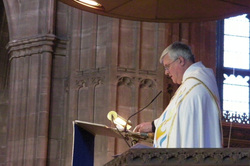What is preaching?

Here's my attempt to define that speech event that happens in Christian congregations:
Preaching is an authoritative and authorized voice in a congregation giving expression to the Christian tradition in such a way as to encourage and enable it to be applicable in some measure in the lives of the hearers.
I realize there is also evangelistic preaching that takes place outside the congregation, but here I want to focus exclusively on preaching within the church for this is the preaching that directly serves the maintenance of the Christian collective memory. (You can find this kind of memory work in the New Testament, for example in 1 Corinthians 4.7; 2 Peter 1.12; Jude 5; Titus 3.10; and 2 Timothy 2.14).
My definition has ten distinct aspects to it:
Preaching is an authoritative and authorized voice in a congregation giving expression to the Christian tradition in such a way as to encourage and enable it to be applicable in some measure in the lives of the hearers.
I realize there is also evangelistic preaching that takes place outside the congregation, but here I want to focus exclusively on preaching within the church for this is the preaching that directly serves the maintenance of the Christian collective memory. (You can find this kind of memory work in the New Testament, for example in 1 Corinthians 4.7; 2 Peter 1.12; Jude 5; Titus 3.10; and 2 Timothy 2.14).
My definition has ten distinct aspects to it:
- Preaching is something spoken.
- It generally uses one voice addressed to a number of people.
- That one voice has usually been given authrority to so speak (sometimes by
an authorizing institution other than those immediately gathered, and sometimes
from within the congregation)
- Preaching normatively takes place within a specialized gathering called a
congregation, whose purpose is more than just hearing the sermon.
- Preaching's subject matter is more or less controlled by its relationship to
an inherited tradition that principally consists of the Bible.
- The social purposes of preaching are determined by the needs of the
congregation, at least theoretically, and the inherently missiological character
of the New Testament.
- Preaching is expressive in the sense that it gives voice to the tradition in
such a way that it impacts on the hearers' emotional, cognitive, intellectual
and practical needs and understandings.
- It enables the hearers to link within their thoughts what is experienced
with the congregation and what they experience in other aspects of their living.
- Preaching is to some degree authoritative in itself in that the hearers are
willing to receive it with generally only indirect ways available to them to
offer meliorating feedback (that said, the contractual-like nature of preaching
means the preacher is aware that there are boundaries of style and content that
may not be crossed).
- Preaching is performative in the sense that the preacher is expected to do
more than simply read a text.

